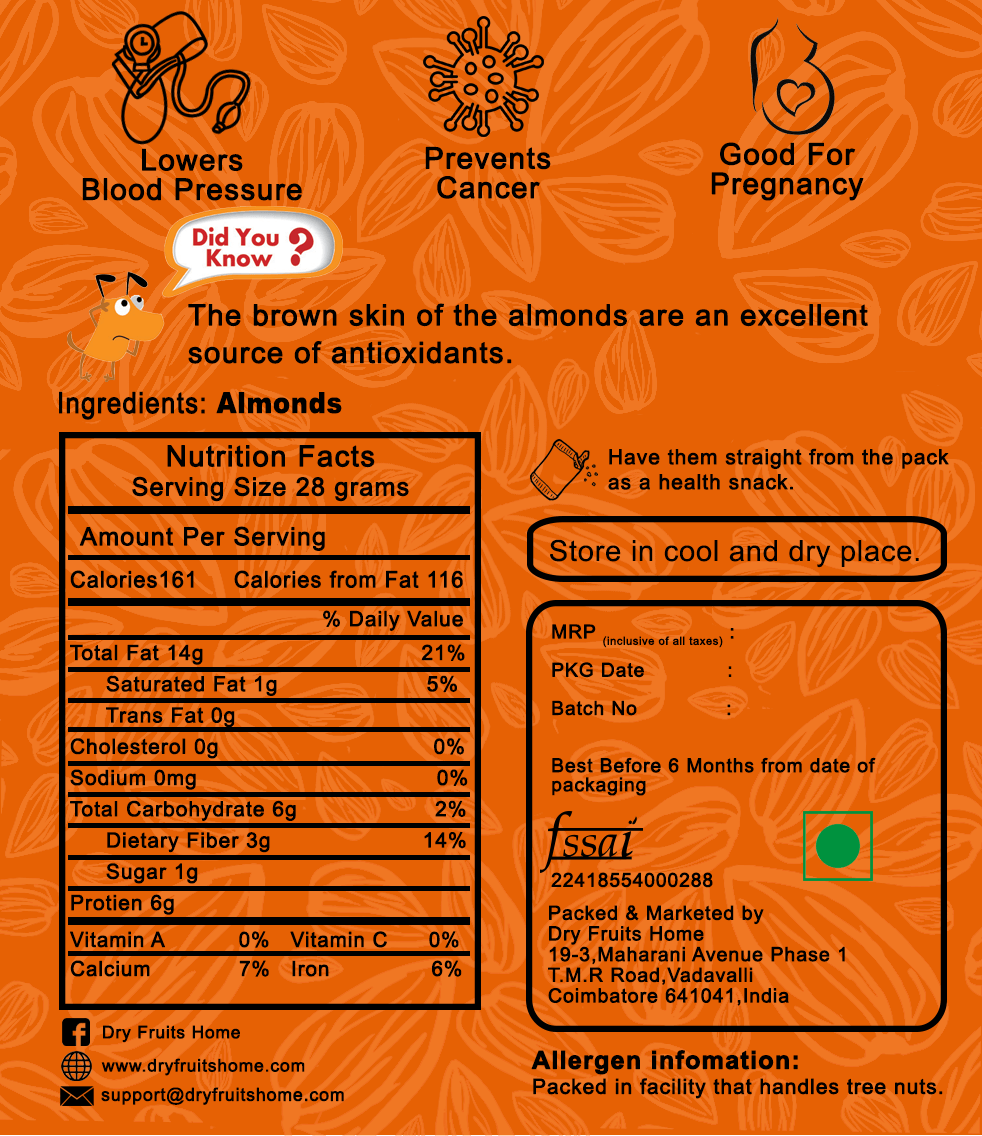Description
California almonds are among the most popular and widely consumed nuts globally. They are not only delicious but also pack a nutritional punch. Here’s an overview of California almonds and their health benefits:
Nutritional Composition:
- Healthy Fats: Almonds are rich in monounsaturated and polyunsaturated fats, which are heart-healthy fats that can help lower bad cholesterol (LDL) levels.
- Protein: Almonds are a good source of plant-based protein. Protein is essential for muscle repair, immune function, and overall body maintenance.
- Dietary Fiber: Almonds contain dietary fiber, which supports digestive health, aids in regular bowel movements, and helps maintain a feeling of fullness.
- Vitamins: Almonds are a good source of various vitamins, including vitamin E, which is a potent antioxidant that helps protect cells from damage.
- Minerals: Almonds provide essential minerals such as magnesium, phosphorus, and copper. Magnesium is crucial for muscle and nerve function, while phosphorus and copper are important for bone health.
- Antioxidants: Almonds contain antioxidants, including vitamin E and other phytochemicals. These antioxidants help combat oxidative stress and inflammation in the body.
Health Benefits:
- Heart Health: The combination of healthy fats, fiber, and antioxidants in almonds can contribute to heart health by improving cholesterol levels and reducing the risk of heart disease.
- Weight Management: Almonds are a satiating snack due to their protein and fiber content, which can help control appetite and reduce overall calorie intake.
- Blood Sugar Control: Almonds have a low glycemic index and may help regulate blood sugar levels. The healthy fats and fiber can slow down the absorption of sugars.
- Bone Health: The minerals in almonds, particularly magnesium and phosphorus, contribute to bone health and density.
- Brain Health: The vitamin E and antioxidants in almonds may play a role in supporting cognitive function and reducing the risk of age-related cognitive decline.
- Skin Health: The vitamin E content in almonds is beneficial for skin health, as it helps protect the skin from oxidative damage caused by UV rays and pollution.
Culinary Uses:
California almonds are versatile and can be enjoyed in various ways:
- Snacking: Eat them on their own as a convenient and nutritious snack.
- Trail Mix: Combine almonds with other nuts, seeds, and dried fruits for a satisfying trail mix.
- Salads: Add sliced or chopped almonds to salads for a crunchy texture.
- Smoothies: Blend almond butter or almond milk into smoothies for added creaminess and flavor.
- Cooking and Baking: Almond flour and almond meal are popular alternatives in gluten-free and low-carb recipes.
Considerations:
While almonds offer numerous health benefits, it’s crucial to be mindful of portion sizes. Almonds are calorie-dense, and excessive consumption can contribute to increased calorie intake. Also, if you have specific health conditions or concerns, it’s advisable to consult with a healthcare professional or a registered dietitian for personalized guidance based on your individual needs and health status.
California Almonds Grade A was last modified: January 20th, 2024 by admin


















Suman (verified owner) –
Very well worth the money.
Neha (verified owner) –
The product is firmly packed.
Radhika (verified owner) –
The inclusion of a handwritten thank-you note in the packaging is a nice gesture.
Tanvi (verified owner) –
The layout of the website is visually appealing and easy to navigate.
Nisha (verified owner) –
Very fast delivery.
Rajat (verified owner) –
Live chat support was helpful when I needed assistance.
Kamal (verified owner) –
The inclusion of a detailed invoice with my order is appreciated.
Nisha (verified owner) –
The option to share product recommendations with friends is a nice feature.